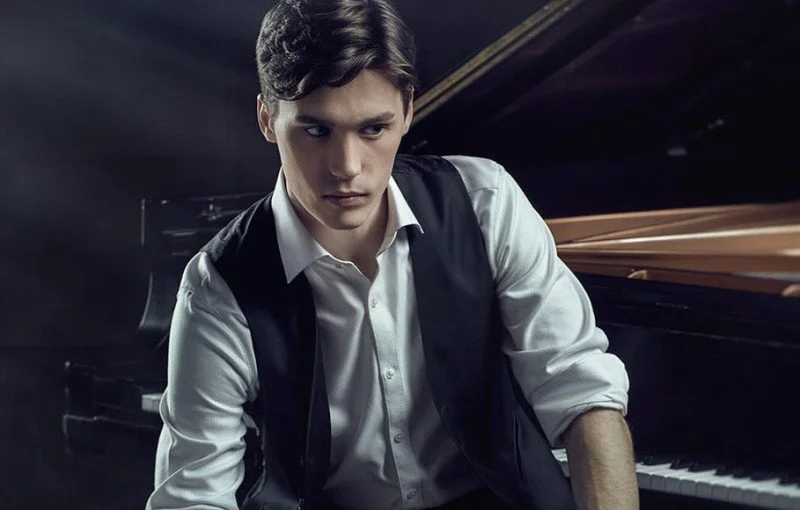Rising piano star Jaeden Izik-Dzurko comes full circle at the Vancouver Recital Society
Salmon Arm-raised talent recalls long commutes down the Coquihalla to pursue his art—and catch VRS Sunday matinees
Jaeden Izik-Dzurko
The Vancouver Recital Society presents Jaeden Izik-Dzurko at the Vancouver Playhouse at 3 p.m. on September 10
BACK WHEN HE WAS only an aspiring musician and not yet a rising star on the international recital circuit, Jaeden Izik-Dzurko and his father grew intimately acquainted with the Coquihalla Highway, thanks to regular trips to Vancouver from their home in Salmon Arm. The trek was more than worth it, though, according to the young piano virtuoso.
“Once I started to study very seriously with [UBC prof] Corey Hamm, who was also my teacher during my Masters, I would have to make that commute on a monthly or maybe bi-monthly basis,” he explains. “And so before I was old enough to take the bus on my own, my father would drive me—a 12-hour round trip, leaving bright and early, having a lesson in the afternoon, and then driving back the following day.”
If scheduling permitted, the Izik-Dzurkos would also give themselves a treat before heading home by checking out one of the Vancouver Recital Society’s Sunday matinees. “Some of the musical highlights of my youth were attending the VRS Sunday-afternoon concerts,” says the 24-year-old. So it’s only fitting that Izik-Dzurko should inaugurate the VRS’s 2023-24 season with a Sunday matinee of his own, at the Vancouver Playhouse on September 10. For lovers of the piano, it’s an event that should not be missed.
While some recitalists craft a program to make a particular aesthetic point or to advance a musicological thesis, Izik-Dzurko says that the four works he’s chosen to play, with input from VRS artistic director Leila Getz, are simply ones that he feels drawn to. Intuitively chosen or not, however, they’ll serve as a useful guide to his capabilities. Opening with excerpts from Franz Schubert’s Moments musicaux will lead listeners into the afternoon with familiar and, as Izik-Dzurko says, “sort of serene” music, while Nikolai Medtner’s Sonata romantica should serve notice that he’s capable of handling the most complex works in the piano repertoire. Maurice Ravel’s Miroirs, although composed between 1904 and 1905, is a “remarkably innovative” work that hints at 20th-century developments to come, and the finale, Frédéric Chopin’s Scherzo No. 1 in B minor, will be appropriately grand.
The program also suggests that Izik-Dzurko is a thoughtful scholar as well as an exceptionally adept technician. After having been introduced to the unjustly obscure Medtner by a friend at Juilliard, he’s made popularizing the late Russian’s works part of his personal mandate. In fact, he’s recorded the Sonata romantica for his CD debut, which will soon be released on the Steinway & Sons record label. (The recording contract was part of the prize for his winning the Hilton Head International Piano Competition in 2022. Also included will be works by Ludwig van Beethoven and Robert Schumann.)
“I heard Marc-André Hamelin say in an interview that Medtner is ‘less melodically generous’ than some of his Russian counterparts, like Rachmaninoff and Scriabin, and his music is a little bit more difficult to get into,” Izik-Dzurko says. “I’ve found on a personal level that often my first exposure to his work is not the strongest—or, rather, I would say that my appreciation for his music grows the more that I listen to it and the more that I know a particular work….The complexity and the polyphony of his writing is very attractive. It’s always rigorous; it’s always very interesting and thoughtful.
“From a pianistic standpoint he was a wonderful performer himself, and his use of the keyboard is very sophisticated, very refined,” he continues. “There are a lot of very beautiful, very intricate textures that he manages to bring out of the instrument. I would call his pianistic style very meticulous. It’s challenging to play because almost every single note has some kind of interpretive indication of one kind of another. Either there’s articulation or a different sort of emotional direction that he wants you to capture. It’s very deliberate, very meticulous writing.”
For those interested in learning more about Medtner, Izik-Dzurko recommends also listening to the Sonata romantica’s companion piece, the Sonata minacciosa. That title, he says, translates to the “Threatening Sonata”, and he notes that Medtner’s epigram for the work was “Have I not been threatened by life?”
“It’s maybe an existential remark, or a remark about his own experience, having lived through world wars and personal strife of all kinds,” the pianist muses. He also observes that the sonata that we won’t hear provides a conceptual link to the work that concludes his VRS program.
“Chopin’s First Scherzo shows the composer in some of his most unsettling moodes,” Izik-Dzurko says. “Harkening back to that Medtner ‘Threatening Sonata’, there’s a certain existential, threatening, menacing quality to it, for sure.”
Not what you’d want to head before embarking on the six-hour drive to Salmon Arm, perhaps, but that won’t be a problem for this young virtuoso’s Vancouver listeners, who’ll be faced with nothing more daunting than the existential threat of parking downtown.














